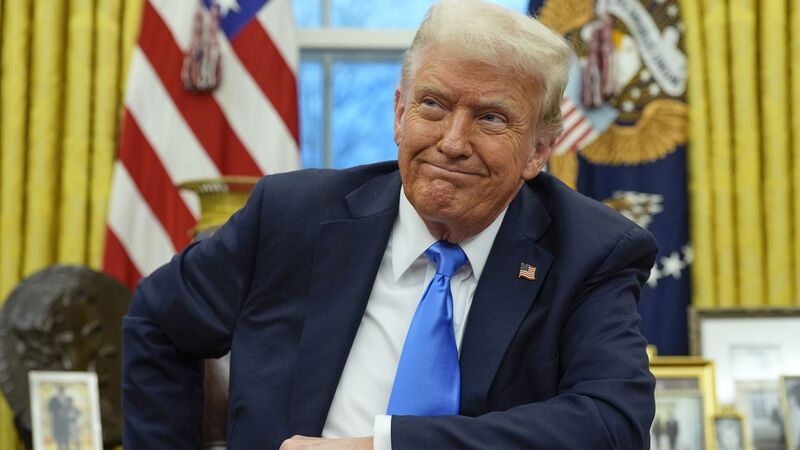Is the US merely in crisis or is it on the road to tyranny?

Many actions during Trump’s first term raised constitutional questions. Picture: Alex Brandon
Moving from a functioning constitutional order to tyranny takes time. So slow it is sometimes hard to tell the difference between a system going through a political crisis and one in terminal decline.
But the question facing us is whether the US, under Donald Trump, is merely in crisis or whether its current legal and political order is ending, ushering in a tyranny.
The US, like Ireland, is attached to its constitution. The US constitution is the oldest functioning written constitution, born out of a need to create a system that would resist tyranny. In 1787, that was George III and the British Empire, but the founding fathers recognised tyranny could also come from within. So, they wrote a document intended to prevent that happening.
The US constitution requires that government act under its terms, or, in other words, within the rule of law. Nobody, including a president is above the law. Like many constitutions, it divides power between the president, Congress and the courts, and between the states and the federal government. It guarantees basic human rights.
Tyrannies are not lawless. But law becomes the tool of the powerful rather than a limitation on power. A clear indicatory of tyranny.
So, what about Trump? Many actions during Trump’s first term raised constitutional questions. Their sheer number makes it impossible to recount them all. The most infamous is January 6, 2021, when Trump pressured vice-president Mike Pence to not certify Biden’s election, followed by the riot and storming of Capitol Hill.
These events, coupled with the undermining of election results, raised the possibility of corruption in US elections. If that were true, ignoring the rules of the electoral system, for instance, the two-term limit for presidents, becomes more acceptable.
Tyranny is more than cruelty or grandiose parades and palaces. Often people benefit (or think they benefit) from it. Removing diversity, equity and inclusion (DEI) creates the impression of benefit to Trump's supporters.
It suggests they were oppressed and those to blame for the many real hardships they face — the opioid epidemic, inflation or deindustrialisation — are those who benefit from DEI. It is because women, African Americans, LGBTQ+ , Native Americans, people and others are encouraged to be active parts of society, that they have lost out.
Immigrants are specifically targeted. The US constitution’s 14th amendment is clear that if you are born in the US, you are a citizen. Four judges are currently blocking Trump’s executive order that blatantly ignores that constitutional provision. Yet, the very process of doing this, ignoring a plain constitutional provision and arguing it does not mean what it clearly does, erodes the constitution.
Firing federal staff across multiple agencies, often outside even the US’s limited employment protections, creates fear. Actively ignoring the law dismantles the rule of law, but also makes people act differently.
They are literally erasing voices, faces from museums, stories from books in schools and universities —including the history of slavery, women’s fight for the vote, and control of their bodies — because they are claimed to be gender or race 'ideologies'.
Funding for university research has been halted, lest it cover issues of gender or race or the climate catastrophe. But slavery happened, women did fight to get the vote, because they were denied it because of their gender, and often their race. The climate is changing. Reducing education serves a purpose. It creates silence.
Each of these actions silences a group, making them lesser citizens.
Constitutions do not stop tyranny on their own. An active public sphere is needed, in which everyone in society contributes. Even cat ladies, as JD Vance described some woman.
"Alternative facts" are now widespread. Making things up or making outlandish claims is commonplace. When Elon Musk claims that social security fraud is rampant, when it is not, or that federal agencies are corrupt, when they are not, based on access to data that is legally dubious at best, it creates a source of power outside of government.
Musk is an adviser to Donald Trump. He does not run the Department of Government Efficiency (Doge), making accountability for his actions much harder. A recent executive order has, in any case, removed the independence of many independent regulatory bodies that may have undertaken such accountability.
Tom Homan, Trump’s immigration czar, declared Congressional representative Alexandria Ocasio-Cortez was acting illegally when she informed immigrants of their constitutional rights. He called for her to be investigated. It’s worth pausing here.
Each declaration creates pockets of uncertainty. We cannot trust what we hear, see, or read. Reality is eroded, including legal reality. On their own, this is problematic, but in combination, it harms public debate, creates fear and silence and makes plainly illegal actions acceptable. These are all indicators of tyranny.

The judiciary sits at the centre of this. They are the ones holding back executive orders, which are either plainly illegal or dubious. In the previous administration, Trump often launched social media storms at judges who did not do his bidding. But a much a bigger step has been taken.
Vice-president JD Vance said: "Judges aren’t allowed to control the executive’s legitimate power." The separation of powers — a very basic component of constitutional orders — requires the judiciary to do exactly that.
Vance is a graduate of Yale Law School. He knows this. This is not an uninformed idle statement. And it is more worrying than any process of filling the US Supreme Court with judges willing to reverse decades of case law which allowed women’s access to abortion. Dispensing, or even suggesting that it is possible, with constitutional checks and balances is a stark moment.
Tyrants hold their power illegitimately, because they came to power illegitimately or because they changed the rule of the game, so their place in office is assured. We’ve seen that in many places. Vladimir Putin changed the office of president and prime minister several times; he altered presidential term limits. So, in three years that may be the test — will Trump try to stay on? But perhaps it is not necessarily Trump himself.
Julius Caesar started the turn of Rome from a republic to a tyranny. But Rome did not return to being a Republic, rather his death ushered in the imperial era. Donald Trump is no Julius Caesar, but in their writings, the US founding fathers established the US to be like the Roman republic except with a system that would prevent that imperial era emerging.
So, the question is not whether Donald Trump is a tyrant. Rather, will he leave a system open for his successors to turn this long-standing Republic into a tyranny.
- Aoife O'Donoghue is professor of law at Queen's University Belfast





